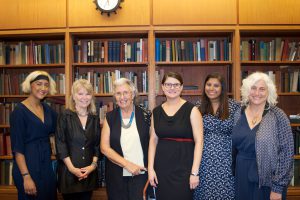Menstrual Health and Gender Justice Working Group Launches with Expert Panel: Menstruation is Having its Moment – How Can Scholars Engage?

On September 20, 2018, the Center for the Study of Social Difference (CSSD) and the Institute for the Study of Human Rights sponsored the launch of a new CSSD working group: Menstrual Health and Gender Justice. The event featured an expert panel addressing some of the most pressing questions related to menstrual health.
Panelists provided insights into how the working group can address and engage with the recent surge in public interest surrounding menstruation in their research.
The panel brought together various perspectives: established scholars and new voices, birds-eye views on ongoing developments and insights from communities, socio-medical and cultural perspectives on menstruation. Inga Winkler, the director of the working group, led five panelists and experts in the field in discussing the methods, opportunities, and risks involved in generating sustainable, evidence-based outcomes and in challenging common misconceptions of menstruation. Both the panelists and attendees of the launch event offered professional and personal perspectives on the current menstrual movement, its history and significance, and the potential ways in which the working group can contribute to meaningful, inclusive change.
- Nancy Reame from the Columbia School of Nursing challenged the idea that menstruation is only now having its moment and drew our attention to research and advocacy on the Toxic Shock Syndrome outbreak in the 1980s.
- Norma Swenson, one of the co-founders of Our Bodies, Ourselves, provided advice on how to develop the current moment into a long-term movement for women’s health.
- Vanessa Paranjothy, an Obama Foundation Scholar and co-founder of Freedom Cups stressed the importance of listening to women and following their lead when working with communities.
- Trisha Maharaj, a graduate student in Human Rights Studies, shared research on attitudes towards menstruation amongst Hindu women in Trinidad. She challenged the conventional wisdom that cultural and religious practices often contribute to stigma based on her findings that women in Trinidad do not perceive them as stigmatizing.
- Chris Bobel from UMass Boston cautioned us that the menstrual health space is driven by assertions and assumptions that are not yet properly explored. She witnesses a heavy focus on providing products to the detriment of addressing underlying issues of institutionalized and embodied shame about menstruation.
Among the diverse perspectives present, the panel agreed that several issues are integral for moving the discussion on menstrual health forward, including: (1) promoting menstrual literacy and body literacy; (2) supporting scholarship aimed to fill knowledge gaps; (3) addressing stigma associated with menstruation; and (4) involving and encouraging collaboration with diverse groups, sectors, and movements. Moving forward, the Menstrual Health and Gender Justice working group will engage in critically evaluating existing developments in the field of menstrual studies, contributing to the body of research and sharing knowledge.
If you would like to get updates and news from the Menstrual Health and Gender Justice Working Group, please email Michelle at mc4225@columbia.edu.
Contributed by Sydney Amoakoh, Michelle Chouinard and Inga Winkler.

